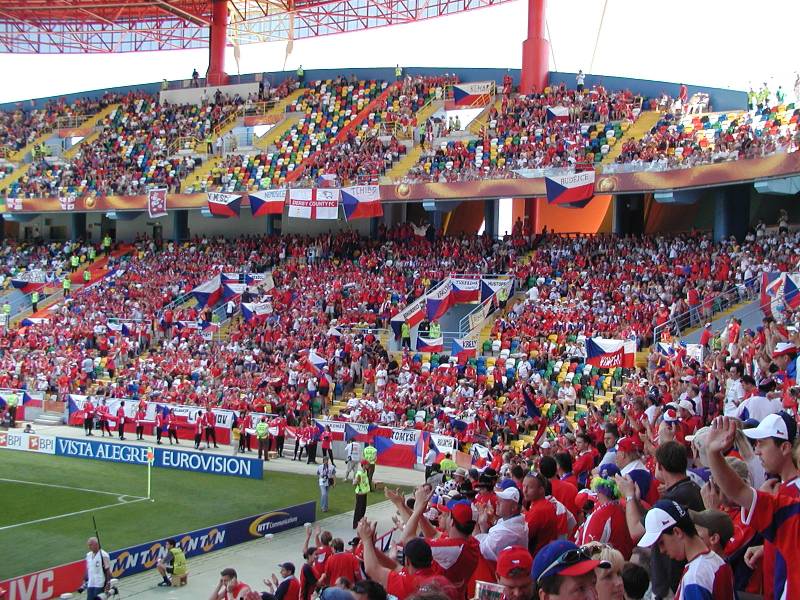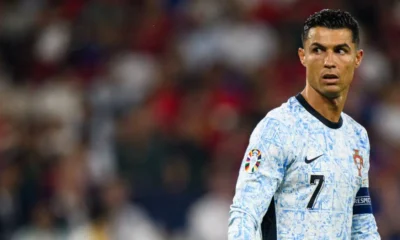Football
VIDEO: Feel free to (dis)cheer, but stay human. What was the match against Portugal like in the stands?
The European Championship in 2004 and tens of thousands of Czech fans jumping in front of the gates of Portuguese stadiums: “Who doesn’t jump is not Czech!” September 2022, a lost home game against Portugal with a desperate performance by the Czech national team. However, the lacklustre atmosphere in the Czech ranks was not only on the pitch, but also in the stands of the Vršovice stadium.

The European Championship in 2004 and tens of thousands of Czech fans jumping in front of the gates of Portuguese stadiums: “Who doesn’t jump is not Czech!” September 2022, a lost home game against Portugal with a desperate performance by the Czech national team. However, the lacklustre atmosphere in the Czech ranks did not only prevail on the pitch, but also in the stands of the Vršovice stadium. A glaring contrast in the Czech fan camp. Are the Czechs primarily so-called success fans?
Of course. The days of Nedveds, Poborskis, Baros and so on are long gone. The national team hasn’t been the roller it used to be for a long time and it has its problems (whether qualitative, personnel, organizational or otherwise).
Czech football has (let’s believe) been overtaken by the era of the Miners and the Berbers and similar buffoons or referees. And you cannot compare these periods of Czech football well enough. But it is fair to look through the fingers at the fans who actively support and do not stop believing in a better tomorrow for Czech football, as youtuber braníkTV captured in his regular show Z KOTLE!?
National team vs. Ronaldo
First of all, however, we have to ask ourselves whether the Czech fans came to cheer on the Czech national team as they tried to fight for a good result, or were they more eager to see the star team led by Ronaldo in action for themselves?
BraníkTV asked a similar question to random respondents from among Czech fans on its programme. You can watch their answers in the attached video below. While this poll cannot be viewed completely objectively, the Ronaldo factor cannot go unnoticed.
Yes, probably a not insignificant part of the fans came to watch Ronaldo and the Portuguese stars first and then the Czech team. Nothing against it, it’s probably a logical and natural phenomenon. However, is it not beyond the pale to elevate this interest above the active cheering of a section of the audience?
During the match, as the video of the braníkTV channel (see below) shows, active fans were in a minority in the Prague Eden and even became an unwanted phenomenon in the eyes of the more or less (in terms of support for the national team) silent spectators.
The label “ultras”
The cause of the expressions of dislike towards active fans may have deeper roots in the demonisation of fanhood in the Czech public space.
The words “ultras” or mere “fans” have slowly become vulgar names for the entire active fan community, not only in football stadiums. Some people may have come to see these terms as hooligan fights, extremism in any form, or it may even (as now against Portugal) have evolved into a perception of cheering as an inappropriate display of affection for a club, a city, a region or in this case a state.
Among other things, this has been contributed to in the past by unnamed Czech sports commentators saying things like “That wouldn’t happen in England” or “They’ve already dealt with the problem fans in England.”
Often, these were insensitively trotted out during mere expressions of joy or frustration by active fans.
One cannot forget the now legendary campaign from the days of the former regime, “Fans, but stay human”. This slogan, which sought to somehow “normalise” the behaviour of fans in stadiums, was then repeated several times in the following decades and survives to this day.
In the media, western foreign competitions are often held up as models, but fans will hardly be shouted down for sitting and not blocking others’ view of, say, Portugal’s megastar Ronaldo (especially in the sectors behind the goals).
In conclusion
It’s only natural that people want to watch star footballers and often at the expense of fans who primarily want to support their team or club. In the case of the national team, it is probably more difficult to find a compromise between these audience groups.
Of course, it is up to the relevant authorities (the FAČR) to deal with this, for example by supporting fan clubs, better organisation at the stadiums themselves, pricing policy or choice of venue.
It’s also clear that if there is a lack of quality and commitment on the pitch, spectators are generally dissatisfied and it’s hard to expect an atmosphere like somewhere in the Bundesliga, for example. However, this is also a problem for the management of Czech football to try to put together or raise a competitive team that will give a responsible performance, regardless of the result. As Jindřich Trpišovský says: “The grass must be on fire.”
That way, Czech fans would have something to cheer for, even if the results are not going well. And maybe then more people would come to see the Czech team than Ronaldo and co. and fewer would have to “suffer” behind the home team’s cauldron.
Let’s hope that this was an isolated case in the match against Portugal and that the atmosphere at the Czech national team’s next matches will be as boisterous and positive as possible.
Source:: braníkTV










